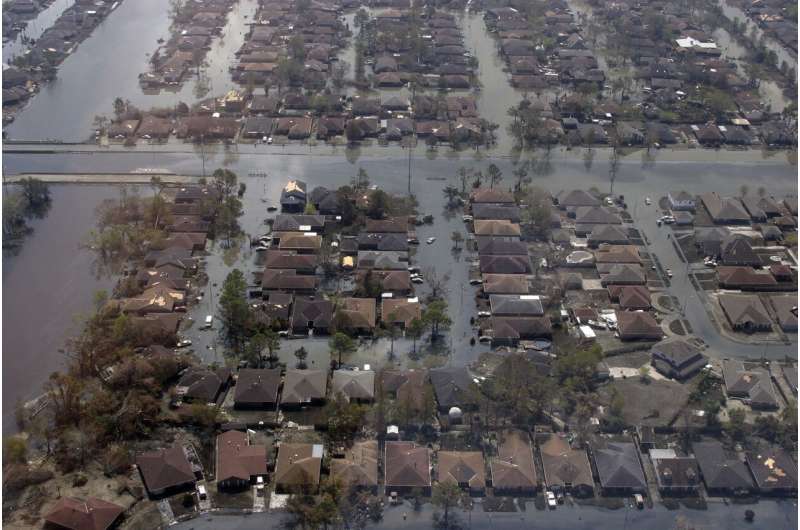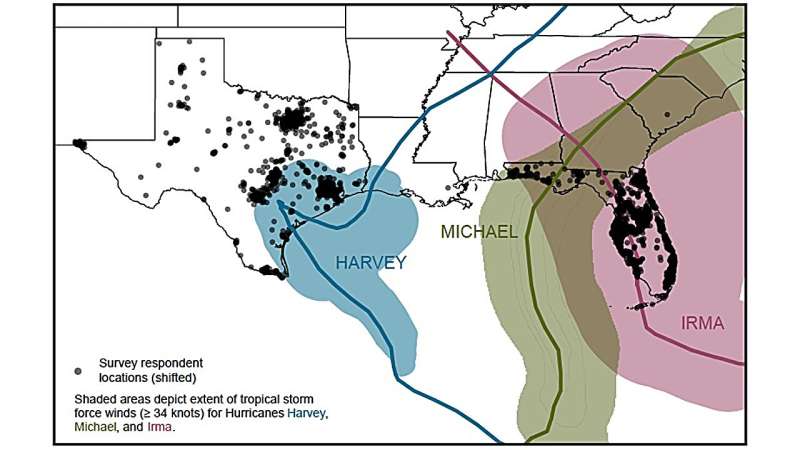This article has been reviewed according to Science X's editorial process and policies. Editors have highlighted the following attributes while ensuring the content's credibility:
fact-checked
peer-reviewed publication
trusted source
proofread
Hurricane risk perception drops after storms hit, study shows

Programs and policies that help households go beyond stocking up on food and medical supplies to invest in longer-term protections could overcome the risk perception gap and support adaptation to rising climate-related threats.
In Texas and Florida, during the five-year period when hurricanes Harvey, Irma, and Michael ripped through the Gulf Coast, many people took steps to prepare their households for approaching storms. People installed sandbags and hurricane shutters, for example, and stocked up on food and medical supplies. But according to research published April 9 in PNAS Nexus, people who took these initial steps too often went on to misjudge their vulnerability to impacts from future hurricanes.
"It totally makes sense that the more things you do to protect yourself, sensibly, your personal risk should be going down," said lead study author Gabrielle Wong-Parodi, assistant professor of Earth system science in the Stanford Doerr School of Sustainability. In reality, climate change is intensifying hurricanes and future risk of property damage and injury is generally going up in many Gulf Coast communities. "All of our findings paint a picture that's worrisome," Wong-Parodi said.

Programs and policies that encourage households to invest in longer-term protections are needed to overcome this risk perception gap and help people adapt to rising threats over time, according to Wong-Parodi and co-authors Daniel Relihan of University of California, Irvine, and Dana Rose Garfin of University of California, Los Angeles. This applies not only in hurricane country, they said, but also in areas facing increasing risks from wildfires, droughts, and other climate-related phenomena.
Taking action
The research expands on a 2022 study from Wong-Parodi and Garfin that found people in Florida and Texas who had experienced major hurricanes first-hand tended to perceive greater risks from an impending above-normal hurricane season, and to say they were taking steps to safeguard their households. The new study, built upon more extensive surveys, looks at how risk perception and actual actions shifted over time based on how recently survey participants had experienced a big storm.
Both studies are part of a growing effort to understand the complex relationship between risk perceptions and behavior as a way to inform programs and policies that can help people adapt to the impacts of climate change and reduce human suffering. "We need to understand what motivates people and offer solutions that resonate with their realities," Wong-Parodi said.
The new research is based on analysis of five surveys of 2,774 residents of Texas and Florida between 2017 and 2022. Surveyors asked residents about their perception of risk from hurricanes, and how they adapted to those risks, whether by putting together an emergency supply kit, installing hurricane shutters, developing and practicing an emergency plan, or purchasing flood insurance. People most commonly reported putting together emergency kits or learning about ways to prepare.
As time passed after hurricanes, the new analysis shows, survey participants' perception of personal risk, including the likelihood of injury and home damage, declined.
"People tend to be adopting those behaviors that are low-hanging fruit, like getting an emergency supply kit, rather than purchasing flood insurance or getting more durable goods that actually may help them with intensifying events," said Wong-Parodi, who is also an assistant professor of environmental social sciences.
Intertwined threats
The researchers discovered that people living in Florida, and people without a college degree were more likely to report feeling at high risk of home damage and injury from future hurricanes. The study authors suggest this may be partly because those with less education may not have as much access to resources and existing power structures, and that they may be more vulnerable to hurricanes and other disasters.
"As hurricanes and other threats fueled by climate change grow more complex, more intertwined, and bigger, more of us are going to be experiencing the dangers of storms, wildfires, and droughts in the future," said Wong-Parodi. When looking at why people may misperceive their risks for climate change-related threats, she points out, it's important to also take into account their other life stressors. "People are facing compounding threats, such as the pandemic, political instability, and economic constraints, that they are also grappling with in their lives."
Wong-Parodi underscores the need for collaborative efforts between scientists and health practitioners to develop effective policies and investment programs. She urges partnerships at the local, state, or federal level to enact long-term solutions, such as programs that offer funding to help people and communities to adapt and prepare for oncoming storms, especially for those groups with fewer resources. "We need to prepare communities, not just support them during and after events," she said.
More information: Gabrielle Wong-Parodi et al, A longitudinal investigation of risk perceptions and adaptation behavior in the US Gulf Coast, PNAS Nexus (2024). DOI: 10.1093/pnasnexus/pgae099
Journal information: PNAS Nexus
Provided by Stanford University




















